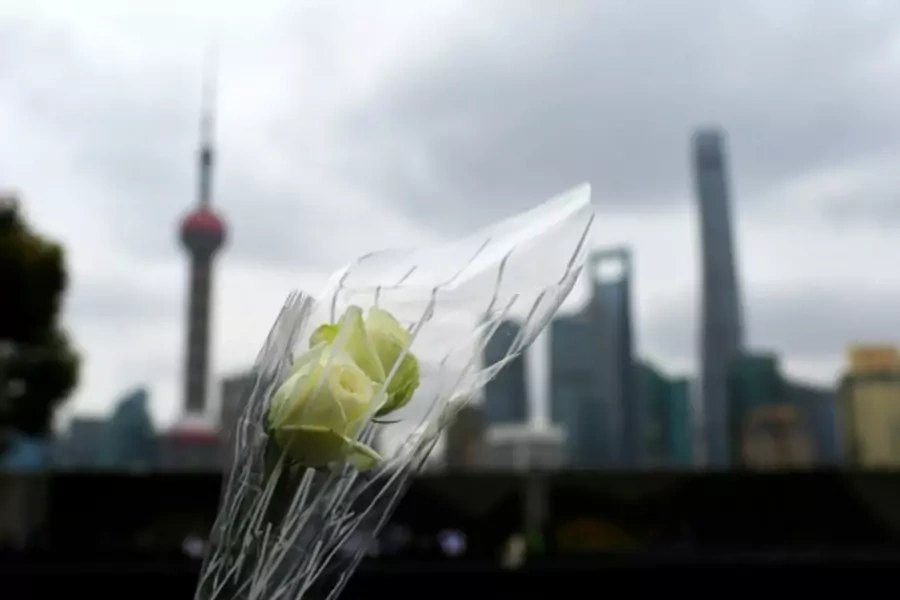Friday Asia Update: Top Five Stories for the Week of January 9, 2015

More on:
Ashlyn Anderson, Lauren Dickey, Darcie Draudt, William Piekos, Ariella Rotenberg, and Sharone Tobias look at the top stories in Asia today.
1. New Year’s Eve stampede in Shanghai. A deadly stampede broke out among the hundreds of thousands of people gathered along Shanghai’s Huangpu River waterfront on New Year’s Eve, resulting in thirty-six deaths and forty-nine hospitalizations. This past Wednesday, grieving loved ones gathered in memorial of those lost. Ahead of the festivities, the government feared overcrowding and went so far as to cancel a planned light show along the Bund; predicting smaller crowds than in previous years, five thousand fewer officers were posted during the celebration, and those on duty were unable to control the crowds. Beijing’s censors and police have been hard at work in the days following the stampede to restrict interviews with relatives of the victims and independent reporting of the incident. Some experts, including CFR Senior Fellow Elizabeth Economy, have argued that Chinese President Xi Jinping has squandered an important opportunity to demonstrate leadership through compassion and understanding for his people during this time of mourning.
2. Sri Lankan president concedes defeat in electoral upset. In the first presidential election since the end of the Sri Lankan civil war in 2009, former President Mahinda Rajapaksa conceded defeat to former ally and government minister, Maithripala Sirisena. Winning 51 percent of the vote, President Sirisena was sworn in on Friday in the wake of a contentious election. President Sirisena has promised to reform the island’s corruption-laced government and establish “equal relations” with India, China, Pakistan, and Japan. Though the United States welcomed the new president and peaceful elections, some experts speculate that Sri Lanka may begin to distance itself from China under the new administration.
3. AirAsia Flight 8501 from Indonesia to Singapore crashes. An Indonesian affiliate of the Malaysia-based airline AirAsia crashed in the Java Sea with no survivors en route from Surabaya, Indonesia, to Singapore on December 28. The crash was the third fatal airline accident involving a Malaysian airline in 2014. Thus far, rescuers have recovered 48 bodies out of 162 passengers and crew, and search and rescue teams detected pings believed to be from the plane’s black box recorder on Friday. The plane was found to have taken off without proper permits, and as a result, Indonesia’s Transportation Ministry levied sanctions against five airlines that have flown routes without authorization. It will also conduct investigations in five of the country’s largest airports. As CFR Senior Fellow Joshua Kurlantzick notes, Indonesia is known to have a poor flight safety record, especially when compared to other middle-income countries.
4. Violence in Bangladesh on the anniversary of January 2014 elections. On Monday, the one-year anniversary of the 2014 national elections in Bangladesh, four people were killed in political protests by the opposition Bangladesh National Party (BNP). In last year’s elections, which was boycotted by the BNP, over half the seats were uncontested, helping the Awami League to win more than a two-thirds majority. Opposition leader Begum Khaleda Zia, who has been confined to her office by security forces this week, called on her supporters to enforce a “nonstop blockade” after the government banned demonstrations. In another incident on Wednesday, police shot dead two protesters and rounded up hundreds more; a third person was killed by anti-government protesters in a separate incident as well.
5. The United States steps up sanctions on North Korea; South Korean nuclear plants hacked. Citing a U.S. FBI report that concluded North Korea was behind the damaging cyberattack on Sony Pictures last month, the White House issued an executive order on January 2 for sanctions that target North Korean leaders. The sanctions apply directly to three North Korean state-owned businesses and ten high-level individuals associated with the regime. The executive order expands U.S. sanctions on North Korea for its “provocative, destabilizing, and repressive actions and policies.” North Korea has denied it was involved in the attacks. The Korean Peninsula has been the focus of not just one but two cyberattack events, as a South Korean civil nuclear energy company was hacked in December, accompanied with the release of personal information of the Korea Hydro and Nuclear Power Company’s ten thousand employees. South Korean authorities have traced the attack to internet protocol (IP) addresses based in the northeastern Chinese city of Shenyang (which is also where the Sony attack is purported to have originated).
Bonus: “Nuts” Korean heiress indicted for endangering a flight. Cho Hyun-ah, former vice president at Korea Air and daughter of its chairman, is being indicted for violating aviation safety after going nuts on an airplane for being served macadamia nuts in the incorrect fashion. She stalled a flight bound for Seoul from New York’s John F. Kennedy Airport because a flight attendant gave her nuts in a bag instead of on a plate, and ordered the plane to return to the gate. She was indicted on five counts of violating aviation safety laws and interfering with safe navigation.
More on:
 Online Store
Online Store